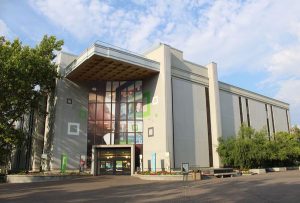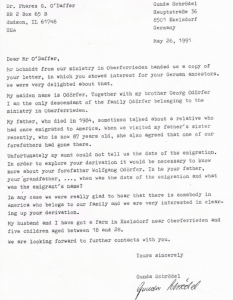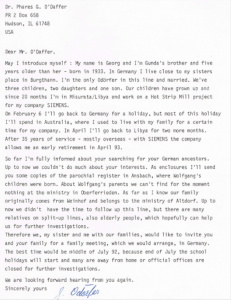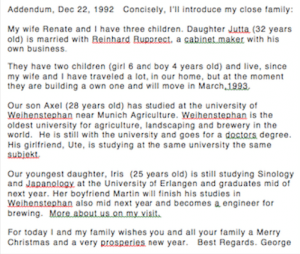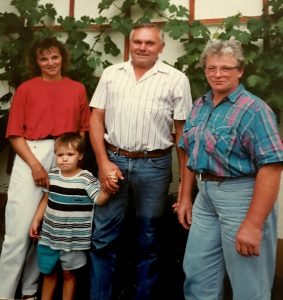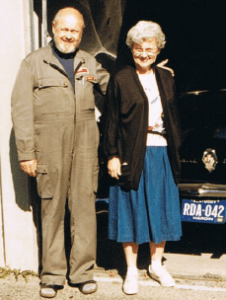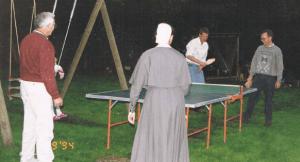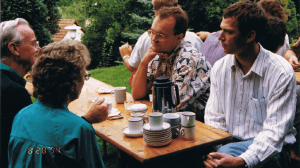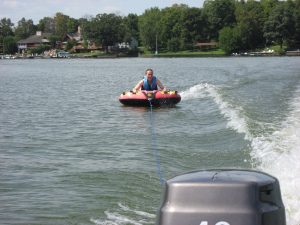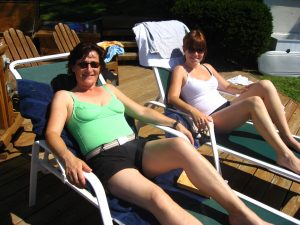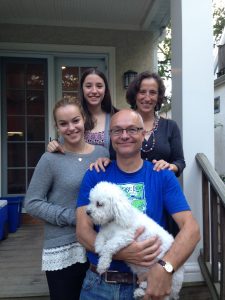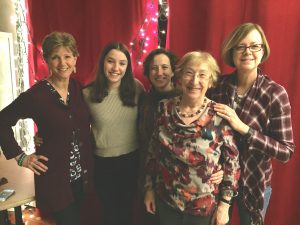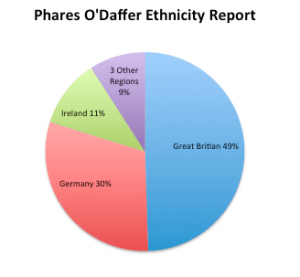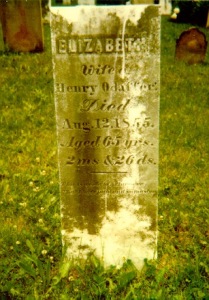The Joy of Genealogy: People!
- At October 27, 2017
- By Phares O'Daffer
- In All Posts, Genealogy
 0
0
As I walked out of the restroom door, preoccupied by it all, I bumped right into her.
She regrouped all 5’ 1” of herself, and straightened her blue jacket with the name “Alma Packer” on it.
As I noted the Church of Jesus Christ of Latter-day Saints Family History Library logo on her jacket, she was first to speak.
“May I help you,” she said with a smile. There was no doubt that she meant it.
I could have quickly said, “ No problem. I’m okay. I’m very sorry I bumped into you,” and walked on down the hall.
But for whatever reason—maybe it was because Alma exuded helpful motherliness—I found myself telling her all I knew about my German ancestors in Maryland, and about Johann Wolfgang Odoerfer, a German Hessian soldier I had discovered.
Finally, almost out of breath, I admitted I’d had absolutely no luck finding out where my ancestors came from in Germany, and had slipped out of a mathematics conference in Salt Lake City to come to this library to find some help.
Well, she said, seemingly four inches taller, “You have come to the right place!”
The Fateful Letter
Alma led me to the counter behind which she appeared to spend a lot of her time, and cut right to the chase.
“Since you say your Hessian soldier relative Johann Wolfgang Odoerfer was in the Ansbach Regiment,” she said comfortably, “I would suggest that you write a letter to some of the main Parishes in and around Ansbach, to see if any Odoerfers still live in the area.”
With all the confidence in the world, she gave me her second big smile and proudly asserted, “And I can help you write the letter.”
And she did!
The first letter that Alma helped me write was to the Church in Oberferrieden, Germany, asking for information about Johann Wolfgang and his family and relatives.
The Serendipitous Moment
In some way, sending the letter made me feel like I had just thrown a bottle with a message in it into the sea, and might never hear from it again.
However, On April 11, 1991, I received a pleasant response to my February 20th letter from George Schmidt, representing the Oberferreiden Parish. However, he could come up with none of the information I had requested.
As the days elapsed into weeks, I had pretty much given up on receiving any information from any Odoerfer in Germany,
And then, on May 26, 1991, when I least expected it, another letter from Germany arrived in my mailbox. (Click on letter to make larger. Click on back arrow in top menu to get back to blog post.)
It was one of those serendipitous moments in genealogy that drastically changes everything.
I had earlier found that Odorfer was one of the versions of my name used by my Maryland German relatives, and now I had found some real live Odorfers in Germany!
I responded to Gunda, and several months later, I received the following letter from her brother Georg, with the addendum coming almost a year later.
A connection had been made between Odorfers in Germany and O’Daffers in the United States!
What Happened From There?
During the years following the initial exchange of letters, an amazing amount of interaction took place among the Odorfers and O’Daffers.
From 1992 on, the following Odorfers visited the O’Daffers in the U.S:
Georg, Renate (Georg’s wife), Gunda, Georg2 (her husband), Astrid (Gunda and Georg2’s daughter), Jutta (Georg and Renate’s daughter), Reinhard (Jutta’s husband), Bastian and Julia (Jutta’s children), Iris (Georg and Renate’s daughter), Martin (Iris’s husband), Clara and Zoe (Iris and Martin’s children), and Enni (Iris and Martin’s dog).
From 1993 on, the following O’Daffers visited the Odorfers in Germany:
Jane (my sister), Arkie (Jane’s husband), me, Harriet, and Herm and Evelyn Harding (Harriet and my friends).
Here are some examples of the many memories from these visits.
Me jokingly telling Georg in 1992 to not to return to the U.S, until he had researched two more generations of Johann Wolfgang Odoerfer’s family, and him doing it in two months.
George calling in 1993 and asking me to search motor home magazines for a motor home for him to buy to drive to South America and Alaska.
Jane and Arkie trying to figure out why the barn was so close to the house on their visit to Georg2 and Gunda’s beautiful homeplace in 1993.
Gunda catching a miracle fish in 47 seconds at Lake Bloomington in 1993 when she and her husband Georg2 stopped by with Georg and Renate, who later drove to Alaska in the motor home.
Georg’s friend Helmut telling us, on our visit to Germany in 1994 that black was the symbol for conservatives in Germany, and that Georg was so black that if you put him in a totally dark room he would leave a shadow.
Me (using a plywood fish for a paddle) and Astrid (in full habit) beating Axel and Reinhard two out of three ping pong games on our visit to Germany in 1994.
Herm and Evelyn talking politics with Axel and Martin in 1994, with Axel illustrating just how far right Georg really was.
Jutta’s children, Julia and Bastian, excitedly eating up the sights and sounds of downtown Chicago when they visited my daughter Sara and her husband Richard and son Wes in Evanston in 2003.
During her visit in 2002, Astrid doffing her habit, diving in Lake Bloomington in her swimsuit, and swimming what seemed like half way across the lake before I could holler at her and tell her that the rules prohibited swimming across the lake. She was a super tuber, too.
Fun at Lake Bloomington when Jutta, Reinhard, and family visited in 2007.
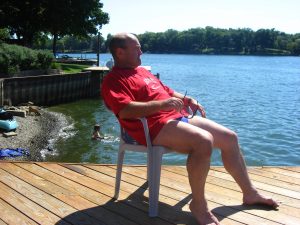
Reinhard at Lake Bloomington. Is that Bastian in the water? or is it Lisa? Find the dog in the picture. If anyone knows its name, please let me know!
Enni, (Iris and Martin’s dog), after coming here with family in Martin’s job move in 2015, gaining full credibility at the Family Christmas Party by being a model dog all day. (A great basket sitter!)
Enjoying the holidays with Renate when she visited Iris and Martin in 2016.
A Genealogy Summary
After I met the German Odorfers, I continued to search for the genealogical connection between the two families.
And Georg put in countless hours tracing the families in Germany. He carried Johann Wolfgang’s line back to Heinrich Ohdorfer in 1560, to only be stopped by the report of a great fire that destroyed records earlier than that.
Annie, a relative of Georg had also helped with the research, as did Lutz Reinwald, another relative of Georg.
When we visited Georg in 1994, Lutz Reinwald had bought a large chart of his branch of Odorfers, which intersected with Georg’s branch. After studying these charts and my chart, we felt we were very close to connecting my branch to these branches.
Sadly, Georg Odorfer died in 2009, and while we thought we had established a connection, because of time consuming family events in the preceding 10-15 years, we had not yet totally documented it.
The Bottom Line
Note that the title of this post is “The Joy of Genealogy: People!” and not “The Joy of Genealogy: Relatives!”
Sure, we have not yet figured out exactly how the Phares O’Daffer/Georg Odorfer families are related.
But does it really make any difference?
It’s pretty clear that there are things in genealogy that are much more important than simply making a documented connection between people with similar family names.
Through involvement in genealogy, I discovered some wonderful friends in Germany — the family and relatives of Georg Odorfer.
When I first met Georg’s adult children, I said to myself “Jutta, Iris, and Axel are really with it. I think they would get along great with our kids.” And this is certainly proving to be so.
This friendship has produced countless hours of interaction and fun, and yes, even mutual support, with a very fine group of people.
Who could ask for anything more?
Things Are Not Always What They Seem
- At June 30, 2016
- By Phares O'Daffer
- In All Posts, Genealogy
 1
1
What do you say when someone asks you what your ancestry is?
With me, it has never been a problem. “I’m German,” I always say with a big smile. “Kannst du sagen?”
I love it when someone asks, because everyone thinks that the last name “O’Daffer” has to be Irish—and I get to surprise them.
And, of course, I follow up by telling them that my name was originally “Odoerfer,” pretty obviously a German name.
“Somebody just poked an apostrophe in there to make it appear more classy,” I say.
Then, if they aren’t too glassy eyed already, I tell about my ancestor link to Germany, Johann Wolfgang Odoerfer, who was my great- great-great grandfather. He came to America as a Hessian soldier, and defected to fight with the Colonists in the Revolutionary War.
I also tell them, “He stayed in America to marry a Pennsylvania woman, and because of them, here am I.”
All of this sounds well and good, but, surprisingly–as I have recently found out—it is not an accurate picture of my true ancestry!
Taking The DNA Leap
About 8 weeks ago, I saw that you could get a DNA kit from Ancestry.com, spit in a vial, send it back, and after a while get an Ethnicity Report from them telling you what nationalities were in your DNA.
Since I like a bargain as much as anybody, and the reduced price was $79, I ordered the kit, and put the wheels in motion.
Sure enough, in about 5 weeks, my Ethnicity Report popped up on my Ancestry.com website, and you could have blown me over with a feather.
It’s All in The DNA
There it was. While my DNA showed a significant part of my ethnicity was German (30%), the major part was English/Scottish (49%)!
And, much to my pleasure, there was a little bit of Ireland in there too (11%).
So, lo and behold, and contrary to what I’ve been telling everyone, I am 70% non-German!
What I had failed to take into consideration in my “I’m German” past was that when you are born you get 50% of your DNA randomly from your father, and 50% of your DNA randomly from your mother.
So I must have gotten a pretty heavy portion of my mother’s British/Scottish DNA, and a lighter portion of my father’s German DNA.
I knew that while my great-great grandfather William Gray on my mothers side lived in Ballyjamesduff, in County Caven, Ireland before he came to America, “Gray” is not thought of as an Irish name.
Now I find out that the people named Gray came from the noble Boernician clans that lived in the Scottish-English border regions, and that many of these people later moved to Ireland.
If I had not been so hung up on the male side of my family, I might have came a little closer to my true ethnic origins, earlier in my life.
So What’s The Moral Of The Story?
Well, maybe the upshot of all of this is that determining the nationalities of your ancestors is a difficult process, and, if we aren’t careful, we can be easily fooled by our genealogy research.
Even determining one’s ethnicity from a DNA sample isn’t an exact science, and often involves an estimate based on the average of an analysis of a large number of samples of your DNA.
But if you want to get a little closer to your correct ethnicity, find out about others who have the same ancestral DNA as you, and have some fun along with it, shell out $79 (without discount, $99) to Ancestry.com, and send them some spit.
Five Things Genealogists Hate to Hear
- At March 28, 2015
- By Phares O'Daffer
- In All Posts, Genealogy
 1
1
My first blog post emphasized how fun it is to do genealogy.
But doing genealogy also involves a pretty good-sized serving of frustration.
These stories, on the five things genealogists hate to hear, illustrate this.
Trash Talk
I was whistling a tune as I drove along, happy because I just felt in my bones that this would be a good genealogy day.
I just knew that my relatives in Jacksonville, Illinois–who I had never met– would have the information I needed about my great grandfather David Odaffer, who had divorced his wife and married a younger Jacksonville lady.
If he had blue eyes and blond hair, as my elderly Aunt Grace insisted, it would be one of the greatest “exceptions to the rule” of all times. Didn’t all Odaffers have dark eyes and dark hair, just like my dad? I needed to know more about David, and I needed a photograph!
Arriving in rural Jacksonville, I had a very nice visit with one of David’s sons with his second wife, and his wife. But when I finally got to the nitty-gritty bottom line and asked them about any photos, letters, or documents they might have about David, all my whistling stopped.
In response to my question, the demure farmers wife -In the words that all genealogists hate to hear- said “Oh, we had some of that stuff, but we cleaned out the attic in ’68 and threw it away.”
Can We Communicate With the Dead?
My good friend Stan Clemens graciously sent me a newspaper article about Whitey Odaffer, from Lima Ohio. It was a surprise, because at that time, I didn’t know about the Ohio Odaffers.
Whitey appeared to be an eccentric old pack rat, collecting everything– literally from soup to nuts.
So in a lifetime of collection, he had, the article reported, collected a lot of information about the Odaffer family.
But as I read the article, it became clear that good ole’ Whitey couldn’t pick very much written material about the family from his pile of collectables- it had to be picked from Whitey’s brain!
“I’ve got to talk to this guy,” my little brain voice kept saying, ever louder and louder.
I drove to Lima and found Whitey’s small house, but the windows were boarded up. Maybe Whitey had moved to a retirement home, I surmised, deciding which neighbor’s house to approach.
“I see Whitey isn’t living here anymore,” I said to the little old lady next door, after finally knocking on her door long enough to bring her out. “Can you tell me how I can get in touch with him?”
Uttering the words no genealogist who’s looking for someone who has special information about the family wants to hear, she said, with a sad smile, “That would be pretty hard, He died about three weeks ago.”
Dante’s Inferno
It was in the dog days of August when my 16 yr. old son Eric and I approached Tarleton cemetery near Tarleton, Ohio.
We drove into the cemetery, looking for the graves of Henry and Elizabeth Odaffer, my great great grandparents.
As we parked, Eric jumped out of the car and began shouting “There it is! There it is! It’s Elizabeth’s grave!”
Sure enough, there it was, almost the first grave we saw, and having weathered the 127 years since 1855.
Obviously, David’s grave should be next to it, but it wasn’t. It wasn’t even nearby, or even in the cemetery! Was it there once, and then washed away or destroyed?
As we looked for a source of information, almost from behind a gravestone, a small, wizened old man with a flowing tobacco stained beard appeared, grass clippers in hand.
“What can I do for ye?” he queried, not with great enthusiasm. “I’m Reynard Potts, and I take care of this place.”
Excited in anticipation, I told Mr. Potts about the grave we had found, and leaped into the question. “Can you show us the past cemetery records for Tarleton cemetery so we can see if Henry Odaffer was ever buried here?
Striking a pose of great authority, Reynard took all the wind out of our sails as he almost proudly pronounced,
“There’s no way you’ll ever find that information. The fire of 1895 burned the cemetery shed to the ground and destroyed all the records.”
Words that are like scraping fingernails on a chalkboard to the ear of an anticipatory genealogist!
Johnny, I Hardly Knew Ya
I went to Decatur, Illinois to specifically find out about two of the Decatur Odaffers.
After much searching, I finally found the house of the Odaffer gentleman who I thought would know the information about his grandfather and brother that I needed to fill in the Decatur Odaffer family tree.
My Odaffer relative lived by himself in the outskirts of Decatur. I soon found his house, and we were sitting on his porch, ready for an informative talk about his relatives.
“Well, George, what can you tell me about your grandfather and your brother? If I can find out about them, the Decatur Odaffer story will be complete”
George moved around a little in his chair, scratched the stubble on his chin, looked a me like I probably shouldn’t have asked, and said…
“I don’t know anything about my grandfather- never saw him. And I haven’t seen my brother for 40 years- no idea where he is.”
Amazing how many people say these words that are bewildering to genealogists. “I don’t know anything about them” (I.e., the people who could be close to them).
Lost and Gone Forever
Early on, in my foray into genealogy, I bought a cheap database designed to keep and display data about my ancestors.
I spent 2 days entering my data, and was proud of where I was headed in terms of keeping good genealogy records.
I was just about done when, lo and behold, on the third day, out of the blue, it crashed!
After much searching for customer support, I called ‘’’the budding company and asked for an expert who could help me retrieve the data.
“Well, said the person on the line, I’m sorry to inform you that we discovered a bug in the software that caused it to crash, and your data can’t be retrieved. So the old software is now out of print. But the revision works just fine! I can send you a copy for $49.95. ”
Not what I wanted to hear!
Conclusion
A lot of difficulty in genealogy, much like life, could be avoided if we didn’t procrastinate.
So if you want to find out about your family, start sooner rather than later.
It will help avoid good genealogical information getting thrown away, burnt is a fire, or informed relatives dying before they get to tell their story.
It may even give you more time to find out about the relative nobody knows, or to find a reliable genealogy computer program!
The Evolution of a Patriot
- At October 20, 2014
- By Phares O'Daffer
- In All Posts, Genealogy
 2
2
Preface
Here is a genealogy poem just for you:
 I saw a duck the other day.
I saw a duck the other day.
It had the feet of my Aunt Faye.
Then it walked heading South
It waddled like my Uncle Ralph.
And when it turned, I must propose,
It’s bill was formed like Aunt Jane’s nose.
I thought, “Oh, no! It’s just my luck,
Someday I’ll look just like a duck!”
I sobbed to Mom about my fears,
And she said, “Honey, dry your tears.
You look like me, so walk with pride.
Those folks are all from Daddy’s side.”
–Anonymous
If it has a moral, it might be “if you want to put yourself of your ancestors in a predetermined mold, you are out of luck.”
And now, a little about my ancestor, an unusual duck, who cannot be put in a predetermined mold.
An Exciting Piece of News!
News flash! John Wolfgang Odaffer was declared a Revolutionary War Patriot by the National Societies of the Daughters/Sons of the American Revolution.
Yes, that’s right. His Ancestor number is A206566.
And right away, two of his descendants, Kay O’Daffer Smith and Phares O’Daffer applied for and became members of the Daughters of the American Revolution(DAR) and Sons of the American Revolution(SAR) respectively.
Was There Ever Any Doubt?
Well, maybe a little. If there was a doubt, it would have been whether or not a person, like Johann (John) Wolfgang Odaffer — who fought for both the British and the Americans in the Revolutionary War — should have been declared a Patriot.
And are we sure that Johann Wolfgang Odoerfer — who came from Germany as a Hessian Soldier to fight for the British — Americanized his name, and was the same person as John Wolfgang Odaffer, who joined General Armand’s Light Horse Division and fought for the Americans?
Making the Case
So we have an unusual situation, probably with strong feelings on both sides of the issue — did the National Society make the right decision? Here are the pros and cons.
I think the case “against” declaring John Wolfgang Odaffer a Patriot is pretty clear, and simple.
- While he did a lot of “holding down the fort” in Rhode Island, and was in very few battles as a Hessian soldier, he did fight for the British as a Hessian soldier, especially at Yorktown.
- If you believe that someone who fought against the Americans in the Revolutionary War at any time simply cannot be an American Revolutionary War Patriot, the case is clear cut.
The case “for” is a little more complicated, and subtle, but here it is, as I see it.
- Thanks to two independent diaries written by Hessian soldiers, and to other carefully documented information about Johann Wolfgang Odoerfer and John Wolfgang Odaffer, it has been verified unequivocally that Johan Wolfgang Odoerfer and John Odorfer were one and the same.
- Evidence strongly points to the fact that because he was deeply in debt, Johann Wolfgang Odoerfer was conscripted by the Ansbach Crown Prince Alexander to fight for the British in the Revolutionary War. He apparently did not want leave his family to go, but had to.
It was common for the crown prince, in order to fill his own coffers with money from the British, to force as many young men as possible to become mercenary soldiers.
The State Archives in Ansbach, Germany, Am 1041, described his situation prior to becoming a Hessian soldier, as follows:
” …. he had spent all of his estate and, therefore, had to enter military service. He has a wife, a 15 year old son, and a 12 year old daughter who are in very straitened circumstances.”
- John Wolfgang was not totally happy with what he was being asked to do as a Hessian soldier. In Hessian Soldier John Dolya’s diary, he states that “On November 13, 1778, recruit Johann Wolfgang Odoerfer ran the gauntlet 10 times for disrespect for an Officer.”
- It took courage to defect from the British Army and join the American forces.
It was reported that soldiers like Johann Wolfgang Odaffer defected because they were tired of fighting Germans like themselves who had earlier come to America and were Colonists.
It is apparent that Johann wanted to fight with the Colonists, rather than against them. A lot of Johann’s fellow soldiers didn’t leave the British Army, but several courageous ones with motivation did.
(The State Archives in Ansbach, Germany, described this simply, as follows:
ODOERFER, Johann Wolfgang, private A/5 Deserted 12 October 1782.
- It is also evident that John Wolfgang Odaffer was an effective, contributing soldier in the American cause.
He served in General Armand’s Light Horse division, taking on the important task of capturing divisions of remaining British troops throughout Pennsylvania and helping bring a swift end to the war.
- He was honorably discharged, and awarded land in Virginia and Ohio for his outstanding service.
Perhaps, for those Biblically inclined, the story of Saul might put this situation in perspective. Saul was a Levite who was deeply involved in the persecution of Christians.
But as he traveled on the Damascus road, he experienced a spiritual transformation, became known as Paul, and spent his life in a quest to further the Christian cause.
I think most forgive Paul’s earlier actions because he genuinely changed, and finally contributed greatly to the good.
So in the case of John Wolfgang Odoerfer, it seems reasonable to decide to honor a person who was forced into a situation against his will, but who, like Saul, saw the error of his ways, and decided to go in a new direction, ending up fighting courageously for the Colonists.
We are all human, and make mistakes. But surely good judgment, courage in decision-making, courage in battle, and ultimate devotion to the American cause, is the stuff of which a Revolutionary War Patriot is made.
The Bottom Line
So I, for one, am happy the National Societies of the DAR/SAR declared John Wolfgang Odaffer, my great great-great-great grandfather, a Patriot. I am proud of him, and will try to honor him through my service to the SAR Society.
5 Reasons You Should Write a Novel About Your Ancestor
- At August 21, 2014
- By Phares O'Daffer
- In All Posts, Genealogy
 2
2
Suddenly it hit me. As I was pouring through the data I had collected on my great-great-great grandfather, it became clear.
Johann Wolfgang Odoerfer had an amazing life! There is a great story here! And it must be told!
So I began writing A Blue and Scarlet Skeleton (see the About– News and Miscellany section of this website) — an historical novel about Johann Wolfgang.
It was a great experience, and here’s 5 reasons why you should consider doing it.
1. Giving Birth To A Story About An Ancestor Is A Satisfying Goal
Here was an opportunity to put the story of our ancestor–who was the connection between the German Odoerfers and the America Odaffers — into a form that might motivate future descendants to read and find out about our history.
To help make Johann Wolfgang Odoerfer “come to life” might just be what was needed to contribute a tiny bit toward creating Interest in Odaffer genealogy in future generations.
2. Writing About Him or Her Helps You Get to Know Your Ancestor Better
If I hadn’t decided to write about Johann Wolfgang, I wouldn’t have looked for the diaries written by Hessian soldiers, and would not know nearly as much about the life of my ancestor.
I might not have known that he had the courage to defect from the British Army to fight on the side of the Colonists in the Revolutionary War, or that he was granted land in Ohio for his efforts as an American soldier.
Nor would I have known that — as recorded in the Hessian soldier diaries — he had to run the gauntlet 10 times for being “disrespectful to an officer.” So that’s where the Odaffer temper comes from!
3. Writing About Your Ancestor Helps You Know Yourself, Your Father (Mother), and Your Grandfather (Grandmother) Better
In my case, when writing about Johann Wolfgang, I needed to think about what he might have been like. Of course, my very first thoughts were “What am I like, and what were my father and my grandfather like?” And how about my father’s male cousins?
These were real people who I had known, and my pursuit of answers to these questions really did, I think, give me a better understanding of myself and them.
4. Writing About Your Ancestor Helps You Know History Better
Who would have guessed that the Margraves of the German provinces were often such money-motivated weasels — conscripting Hessian soldiers against their will to fight for the British?
Researching the novel also helped me learn a lot about the British use of mercenary soldiers.
And I really learned a lot about the significance of the Battle of Yorktown in influencing the outcome of the Revolutionary War. What a neat way to learn some history!
5. Writing The Novel Might Spark An Idea And Motivation For Additional Genealogical Research
As an example, writing the novel caused me to think about what happened to Wolfgang Odoerfer after the battle of Yorktown. This need led me to discover the Washington-Rauchambeau trail in Virginia, the prison at Winchester, and the connection to Maryland.
I also realized that in order to do the story justice, I really needed to find out what happened to the son, daughter, and wife Wolfgang left in Germany. This initiated a search that is still ongoing.
So, try it (writing about an ancestor) — I’m sure you’ll like it. It doesn’t have to be a Pulitzer Prize winning novel — just a story about your ancestor, for your descendants to read.
And you’ll gain some surprisingly valuable extra benefits (1-5 above) as you go along.
Why I Am Not a Real Odaffer
Brief Preface
This is a rare blog post for me, in that it is focused pretty much on “I” and “me.” Please excuse, and be gentle in your deserved criticism.
About Real Odaffers
I grew up on a farm. It just seemed that to be a “real Odaffer,” you had to be a farmer. Sort of an unwritten rule for us Odaffers.
My dad Ray was a farmer. My grandfather Ed was a farmer. And my great grandfather David was a farmer, and so was my great great great grandfather Henry. I later found out that my great great great great grandfather John Wolfgang spent the latter years of his life working on the John Mason farms in Maryland.
And whale of a lot of other Odaffers have been farmers, including one who wanted a male child to help him farm, but was blessed with eight daughters.
But when they came to me, they must have thrown away the mold. Somehow, at an early age, I knew that, even though I liked the farm, I was not going to be a farmer. I was not going to be a “real Odaffer.”
So now, at age 80, and even after having owned a farm or two in my life, I feel a need to figure out why full-fledged farming just wasn’t for me. If I knew, maybe I could help some young Odaffer-wondering whether to be a farmer — to make his or her career choice.
What Growing Up On A Farm Did For Me
As I look back upon my life, the one thing that stands out in stark relief is that growing up on a farm really painted the heavens for me. There was something about the richness of living on the farm that helped me develop a positive approach to life.
Like the animals, I was always ready to engage in a new day. And the planting and harvesting gave me the feeling that you could count on things to generally come out OK. It felt safe and encouraging.
The idea that if you worked hard you could provide almost everything you and your animals needed — the good ole Midwest work ethic — gave me a lot of satisfaction and security. And because we were very poor and had almost nothing- I learned to live simply and wasn’t preoccupied with the need for “things.” You feel pretty positive when you have everything you need.
And on top of this, the farm was interesting. “Why are you spending all this time smacking those corn stocks together,” my sister Jane would ask — really dying to know. It didn’t feel right to tell her that I was pretending to be Knights of the Round table, engaged in a fierce battle, or Robin Hood and Friar Tuck fighting with quarterstaffs, or Beowulf, who I thought was a brave Viking, engaged in a battle for his life.
The farm was a great place to exercise my imagination- to pretend- and to get those creative juices to flow. It was simply a fun place to be.
Why Did I Almost Stay On the Farm?
Yes, I almost did.
At Deland-Weldon Senior High School — almost to my own surprise — I took Vocational Agriculture classes, and joined the FFA (Future Farmers of America, no less). I was FFA president, and received FFA awards. Farming, in rural Weldon, Illinois, just creeps into your blood.
I learned about agriculture, how to judge cattle and hogs, how to select and plant grain, how to do basic work with tools, and a lot more.
Some would have said I was on my way to becoming a Jim-Dandy farmer!
One spring afternoon — when I was 15 years old — I was with a group of classmates and my Vo Ag teacher on a farm tour when news reached us that my father was involved in a farm accident.
When we arrived at the field, where my father and a helper had been building a fence using a tractor with a post-hole digging auger attached, I was totally shocked and devastated to see my father’s dead body wrapped around the auger. There was nothing anybody could do.
My brother-in-law farmed our farm the rest of that year, and then we sold it.
I think if I have been 18 instead of 15 when my father died, I would have felt a greater obligation and capability to take over the farm, and might have retired a farmer, just like my father and grandfathers before me.
So Why Did I Not Become a Farmer?
After much thought, I come to the conclusion that I simply just don’t know for sure. But I do know it was not a choice made by chance. I knew early on that I really didn’t want to be a farmer.
Interestingly, even though my father’s death affected me deeply, I don’t think it was a major factor in my not becoming a farmer. On the contrary, it got me as close to being a farmer as I ever got.
It was a fact that no one on my mother’s side ever farmed. It just seemed that they, too, knew that they did not want to be farmers. I think they simply were not made that way. Perhaps I had an overbalance of genes from my mother’s side.
Or maybe there is this deep-seated guidance system in a person (some might call it “God’s guidance” that simply let’s you know that there are other things in store for you.
Whatever the real reason, after all these years I can only say, “Sometimes you just feel things ‘in your bones.“
Looking For Clues
When I was a kid, we used to go tromping through cemeteries.
My dad, as you’ve probably figured out, is Phares O’Daffer, the “stumbleologist” who has spent a lot of his spare time in the last 58 years collecting and sharing information on our ancestors.
On family vacations or trips out east, we’d often take detours through the countryside to find old gravesites. Particularly in Ohio or Pennsylvania where some of the earliest Odaffers lived.
“Alright, everybody out of the car,” Dad would announce as he pulled our station wagon up to some tombstone grassy knoll. “Start looking for Odaffers.”
My sister Sue and I would pull our heads out of our books, put our shoes on, and gamely start tromping through the cemetery looking at each tombstone for clues to our past. It was a game for Eric, our brother, who was too little to know what we were doing. Mom went along with it because she knew how important it was to Dad.
And, like everything he does, Dad made it fun. “You’ve got 10 minutes,” he said. “Find me someone who was born in 1850. First one who does gets a milkshake.”
Come to think of it, running around a cemetery was a brilliant ploy to break up the monotony of riding in the car on a long trip. Get some exercise and tire us out so we’d stop asking, “Are we there yet?” And no matter who found what, we all got milkshakes.
Also, it was a way for Dad to involve all of us in his research into our family history. I never really appreciated that as a kid. As we grew older, none of us became interested enough in genealogy to carry on where he left off.
But I don’t think Dad ever expected that. He just wanted to pursue his passion and be able to share what he’d learned. Hence, this website.
Turns out that Dad’s first big discovery about our ancestors didn’t happen in a cemetery, but a library. The Daughters of the American Revolution Genealogy Library in Washington, D.C., to be exact.
Searching for clues in libraries on our family vacations wouldn’t have been nearly as much fun as going to cemeteries.
Genealogical Truth is Stranger than Fiction
- At March 04, 2014
- By Phares O'Daffer
- In All Posts, Genealogy
 1
1
You have probably heard the old saying, “Truth is Stranger Than Fiction.” As I have gotten involved in Genealogy, I am amazed at the truth in this timeworn adage.
No matter how hard I might try, I couldn’t come up with fiction that would come close to matching some of the genealogical facts I’ve discovered about our family.
Let me use some situations, a few perhaps mentioned before, to illustrate.
A Surprising Link to the Old World
You might think your ancestor came over to the new world on a ship of immigrants, but it is much harder to believe what I discovered in a DAR library:
- That he was a Hessian soldier who came on a British Soldier transport ship that took four months to get here
- And that he had left a family in Germany, and later stayed in the U.S to start a new family
A Soldier Who Fought on Both Sides
Who would believe that Johann Wolfgang Odoerfer would have fought for the British as a Hessian Soldier, defected, and fought for the Colonists in the same Revolutionary War?
And was given land in Ohio for his service to the Colonists? And was declared a Patriot by the DAR? You’ve got to be kidding.
A Disappearing Cemetery
Wait a minute! A cemetery with 25 gravestones here one January, and gone the next? And back the next?
Well that was a case with a small Odaffer family cemetery I discovered near Monticello, IL.
After I visited in a January snowstorm, some vandals had taken all the stones and thrown them in a nearby creek.
The local genealogists found and replaced them — making the cemetery better than before. If you hadn’t seen it, you may not have believed it!
A Prolific Great Grandfather
It did seem a little strange to find that my great grandfather David had 15 children over a span of 35 years, with two wives, who differed in age by 31 years.
I don’t think I would have written this into a book of fiction — it just seems a little too far-fetched.
The Gravestone Mystery
And there are my great great grandfather Henry Odaffer and his wife Elizabeth. Married to the end — no divorce record can be found.
Yet, Elizabeth’s gravestone sits lonely, just inside the gate of the New Tarleton Cemetery in Tarleton, Ohio. Henry’s stone is no place to be found, and there isn’t even a space for it.
In fact, I’ve looked high and low, in Maryland (in case they somehow took him back to his place of birth for burial), Ohio, and Illinois, and can find no grave/gravestone for Henry anywhere. It remains a mystery.
An Amazing Family
And who would believe that this website and my database contains information on over 1,300 Odaffer individuals and relatives — probably over 90% of the Odaffers who live or have lived in the United States?
And what an interesting group of people! Just when you think you know it all, you learn something new. I had never known of an Odaffer who was a physician.
Then, just last week, I found out that in 1942, Dr. Robert George Odaffer sold a hospital he owned in Farmington, New Mexico and bought the Cushman Ranch in Colorado to develop a tourist resort. Stuff for a novel, indeed!
So there you have it. You think what you want. But I think that in genealogy, truth is stranger than fiction — by far.
What’s in a Name?
- At February 05, 2014
- By Phares O'Daffer
- In All Posts, Genealogy
 1
1
The Dilemma
Well, there it was. Right there on my birth certificate. “Odaffer.” Small “d,” no apostrophe.
I had been using “O’Daffer”– capital D and an apostrophe all my life — and my name was listed that way as an author of a whole bunch of books. And everywhere else. All of my precious — but significant only to me — award plaques said “O’Daffer.” Capital “D” and an apostrophe.
No way I could change the spelling now. But I felt I was cheating on history. If I could go back, I thought, I would darn well use “Odaffer.”
In fact, when they used Odaffer on my plumbing bill recently, I smiled and let it go — I sort of liked it.
Am I Alone?
Over the years, when I would interview a relative, the spelling of our name would often come up, and people did not always agree. Here are a couple of examples.
A Quote from a California Relative: “I can’t understand why some people have changed our name. It has always been spelled “O’Daffer” with an apostrophe and capital “D”! I just don’t like people messing with our name.”
A Quote from an Illinois Relative: “ Somebody, I don’t know who, tried to make our name Irish. Well, we’re German. It is “Odaffer” with a small d and no apostrophe. Always has been. Its just foolishness to try to change it.”
So others have had consternation about the spelling of our name. I was not alone!
What to Do About It?
In a fit of humor, I thought “WWJD?” Not quite what you thought, perhaps.
I was thinking, “What would Johann Wolfgang, my great, great, grandfather who came here from Germany do?
So I went back to Johann Wolfgang and his ancestors, to get the name straight. Johann Wolfgang Odorfer, or Odoerfer — in some records. Johann’s father — Marcus Ohdorffer. Marcus’s grandfather — Stephan Ohdorfer. And Stephan’s grandfather, way back in 1560 — Heinrich Ohdorfer.
But wait! What about the prized name “Odaffer”? Yes, I found it. Johann Wolfgang Odoerfer, like a lot of German soldiers who stayed in America, simplified his name. He used “John Odaffer.” It was his “Americanized Name,” so to speak.
But it didn’t end there. I took another peek at the 1780,1790, or 1800 census information. I guess the census takers were people that were somewhat hard of hearing, and a little lax about “getting the name right.”
The census is replete with names of Johann Wolfgang and his descendants spelled “Odeffer,” “Odoffer,” and even “Odofer.”
Looking further, I think I found that the name “O’Daffer” was first used by one of John Odaffer’s children — John B’s branch.
My guess is that one of the kids married an Irish lady, and the name Odaffer was just too close to an Irish name to pass up, so she changed to the more “stylish and Irish” spelling — “O’Daffer”
And my oldest sister Wanda, finding out that the Decatur branch of Odaffers used “O’Daffer,” could not resist the classier moniker either, and used it in High School. I followed her in school, and just fell into using “O’Daffer” because that’s the way the High School spelled it.
So it seems that there is, and always has been, confusion about the spelling of this reasonably interesting name. Not much anyone can do.
A Final Word
So there you have it. With all the changes in spelling through the years, no one has a claim on the “correct spelling.”
But, after Johann Wolfgang chose it as his American name, my great, great grandfather, my great grandfather, my grandfather, and my dad all used “Odaffer,” and that should have been good enough for me.
(Woops, I just noticed that someone, on my great grandfather’s death certificate, spelled his name “David O’daffer.” Small d and an apostrophe.) Oh Well…
Johann Wolfgang Odaffer IS a Patriot
- At December 28, 2013
- By Kay Odaffer Smith
- In All Posts, Genealogy, Guest Posts
 0
0
After outlining my own interest in family history and in becoming eligible to join the Daughters of the American Revolution, I will now relate the often frustrating process of getting Johann Wolfgang Odaffer declared a Patriot.
My Initial Difficulties
In assembling my initial DAR application, I only had partial information and the application was returned with many questions.
The DAR National Society Genealogist concluded: “It remains to be proven whether John Odoffer of Maryland is the man who performed service in Virginia. A conclusion cannot be reached based upon the evidence provided.”
Our problem was complicated by the fact that the American Genealogical-Biographical Index (AGBI) references a John Odoffer born in 1740 in Virginia. The citation for this information is the book Virginians in the Revolution by John Hastings Gwathmey.
However, the Gwathmey book does not in fact contain a birth date or place of birth for John Odoffer. I have learned it is common practice to assume soldiers were natives of the state in whose army they fought.
The application also was rejected because I had not noted the information Phares O’Daffer had developed concerning Johann Wolfgang’s marriage in Germany and the two children from that marriage. That should have been included to support his service as a Hessian.
There were numerous other discrepancies cited, generally having to do with the typical inaccuracies which occur when census forms were completed in the earliest days of our country.
One of the most notable difficulties came from the fact that John Odaffer had been given a land grant by the Virginia House of Burgesses, but we had no information about what happened with that grant. Omitting any mention of a search for land records was not helpful to my cause.
The Impossible Takes a Little Time
At any rate, the first rejection made me more determined than ever.
Phares was most helpful with the additional documentation he had, copies of documents and church records were received from the Clear Spring, Maryland area, and a trip to the Newberry Library in Chicago was most helpful.
I was able to get actual copies of all of the books I needed in which John Odaffer was mentioned and photocopy relevant pages.
I reassembled my material, wrote a rebuttal and sent the package back to Washington, all to no avail. The genealogist there was still stuck on the fact that my ancestor seemed to be from Virginia, lived in Maryland, and married a woman in Pennsylvania.
What a muddle! I learned subsequently that differences such as this automatically throw up a red flag when the national genealogists begin to check applications, presumably because people were not as mobile then as now. They can be explained, but cannot simply be left without further notation.
Nothing Helps Like Good Help
A good friend who was Regent of the Sgt. Caleb Hopkins Chapter, DAR, put me in touch with the Illinois State Membership Chair, who had a great deal of experience resolving “sticky” issues such as mine had become.
She took on the task of filling in the missing information by contacting “volunteer genealogists” which nearly every DAR chapter has. These kind ladies in Ohio and Maryland searched local land records and concluded the grant must have been sold since there was never property registered in the name of Odaffer.
Having made the search was enough for the national genealogist. Also, the volunteers pieced together the history of the family’s migration from Maryland to Ohio and made logical conclusions that led to a favorable result.
It Took a Lot of Documentation
Documents used were the Estate Distribution dated March 1816 from Washington County, Maryland, naming the heirs of John (presumably his children).
Also used were the 1810 Census showing John and wife, aged over 45, with eight children, the 1850 Census showing Henry and Elizabeth (ages transposed) with their children in Clear Creek, Fairfield County, Ohio, and the 1860 Census when Henry was living as a member of son David’s household in Pickaway, Pickaway County, Ohio.
All of this is tied back with the 1910 Census in Jacksonville, Morgan County, Illinois, where David lists the birthplace of his parents.
Also used was an excerpt from the “German-American Genealogical Research Monographs #2,” by Smith, published in 1974, p. 43, where Johann Wolfgang is reported as a deserter in Ansbach, Germany who had been conscripted to serve as a mercenary. Also, his family history was verified using a German Parish Register in Ansbach.
Success!
When the application was submitted with all of this information and supporting documentation, Johann Wolfgang Odaffer was declared to be Patriot #206566 in recognition of his support of the War for American Independence.
And I was accepted as a Daughter of the American Revolution! It was all worth it.

